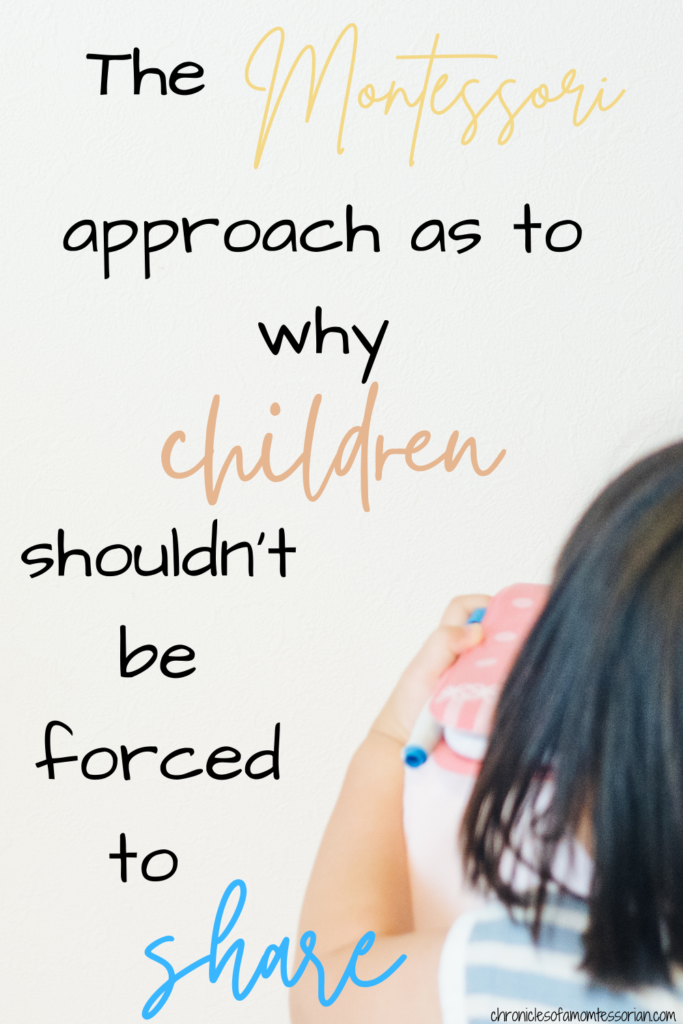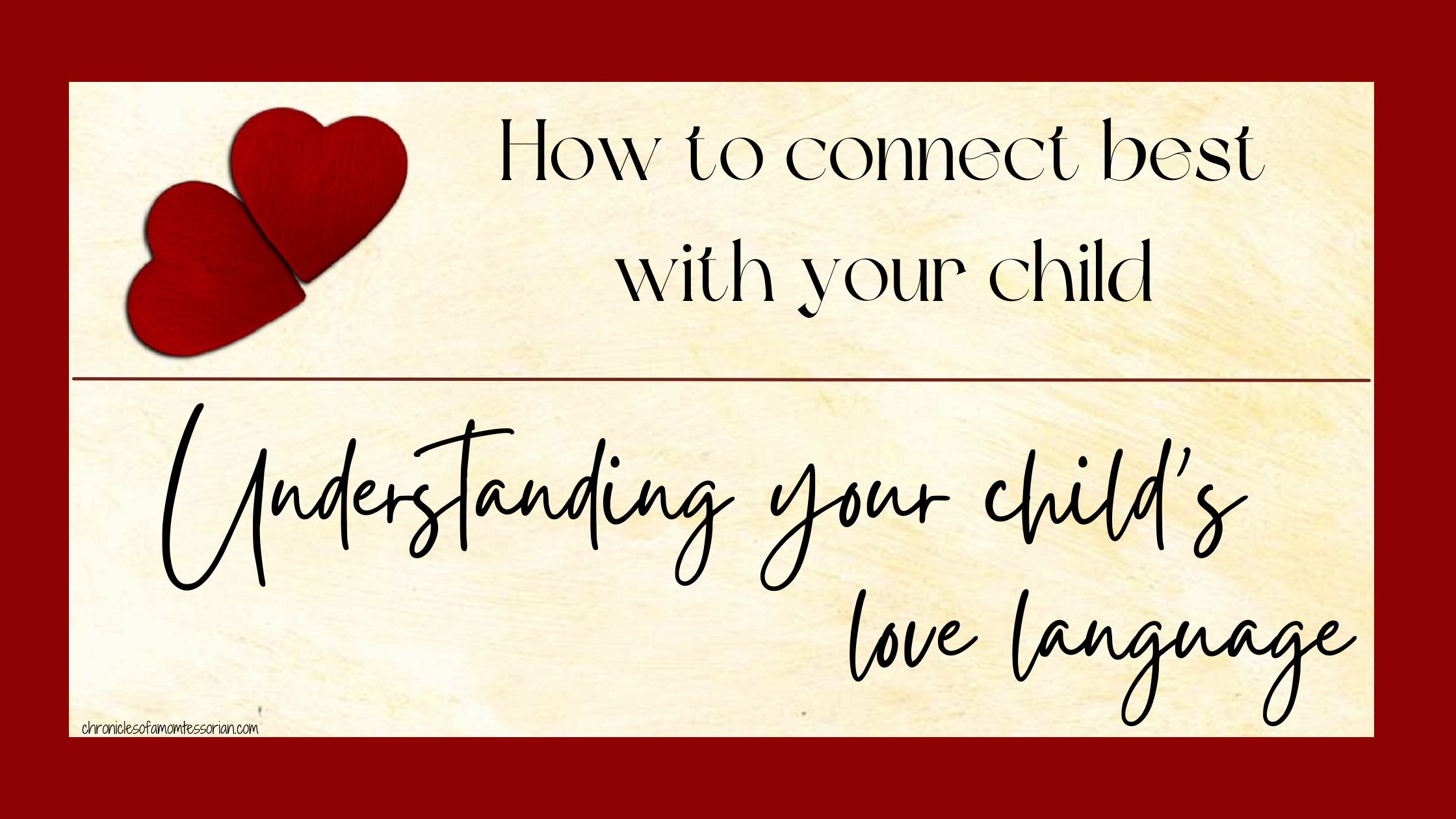Do you ever wonder if you should make your child share with their siblings or other children?
I break down the Montessori way to answer this parenting question!
The original Montessori Tidbits Series contained just three parts, but it was and is still so popular that I decided to add additional parts to the series!!
So here it is…part 4 of the updated 4 part Montessori Tidbits Series!!
The dreaded topic of “sharing”
Let’s face it, as parents, we have all been in a situation where your child is playing with something and over comes their sibling or another child either asking for the toy or asking to join in and play. SO…what do YOU do? In most instances, there are two options:
- ask your child to share
Where in most cases they will object; which in turn will lead to:
- forcing your child to share
Many parents wonder…should I ask or force my child to share? Most times, parents will say yes. It is normally the answer most parents go with, but it may not be the best choice. Yes, sharing is about being generous and kind, and is an important trait that children should learn. However, they should not be forced into learning it.
The Montessori way
In a Montessori environment, there is a particular way to deal with the topic of sharing. The activities are placed on individual trays or in individual baskets and put on the shelf in a particular space. The principles behind the Montessori Method promote the ability for children to freely choose work or materials from the shelf at any time. The environment as a whole is set up so that everything is commonly shared, used and available for all of the children. Most works are set up for one child at a time, and there are only one of each of the works in the environment.
Related post: Montessori Tidbits Part 1: 10 ideas to achieve a peaceful home or classroom setting
So, how is sharing conquered the Montessori Way?
Quite frankly, it’s not.
Sharing doesn’t pose an issue in a Montessori environment since there are general practices set up early on. Children in a Montessori environment are not forced to share the work or material they are working on. The general rule is that if a child is working on a particular work or material, it is simply not available to other children. The Montessori philosophy is all about choices within reason. Most works or materials are designed for one child, and if another child asks to work with them, it is their choice to either decline and work alone or to agree and work with another child.
Here are the reasons behind this thought…if a child chooses a work, then it is their work for as long as they innately and developmentally feel they need to work on it. If another child is wanting to work on something another child has, they simply must wait. They are guided to choose another work or material to do until the other child is done. Although these ideas are mainly used in a larger classroom setting, these same principles can be utilized in your parenting and in your home as well.
I know what you’re thinking; making a child wait seems a bit harsh and unfair but there are actually benefits to this way of thinking.
Reasons why children shouldn’t be forced to share
In most cases, forced sharing leads to a power struggle between the adults and the children involved. Unfortunately, forced sharing sends the wrong message to children.
It shows them that:
-
crying or throwing a tantrum gets them what they want…immediately
For the child wanting a toy another child has, they see that crying and throwing a tantrum will get them what they want. That is not the message you want to send to your child.
-
parents or adults are in total control of every situation
When parents or adults force a child to share it shows that children have no control of the situation and are not important. We have to relinquish some control over to the child to work out their own problems.
-
their wants and needs are not important or respected as a person
For the child who doesn’t want to share, forcing them to share makes them feel that their feelings and needs are not important. Children need to feel that their opinion matter just as much as adults.
Related post: Montessori Tidbits Part 2: Positive Discipline the Montessori way
On the flip side, by not being forced to share, children can actually learn valuable life skills that will help them in the future.
They can:
-
develop empathy
Most children innately develop empathetic feelings and realize that another child would like a turn with the work, so they ensure that they get a turn. These are tools that are modeled and talked about with your child, providing them with ways to use their words and work out the situation with the other child.
-
learn to advocate for themselves
They learn to kindly and respectfully work out their problems with others by using tools that are modeled and taught. If an adult is always jumping in and setting limits, it takes the learning experience away from the child. Children will learn from these experiences and use them in the future.
-
develop self regulation and self discipline skills
They develop self discipline to know when they are satisfied and done using a particular activity, and are able to then allow another child to use the activity. This also promotes generosity, kindness and giving, since children enjoy making each other happy!
What to take from this
In the end, it is all about providing children the necessary life skill tools needed for adulthood. Teaching your child how to wait, how to communicate effectively with others, and to learn how to want to share with others. You want your child to innately develop and learn patience and empathy, not feel resentment and anger for being forced to share. When children are not forced to share, they on their own learn how to be giving, kind and how to positively handle complex situation with others.
Related post: Montessori Tidbits Part 3: Grace & Courtesy-Teaching children manners
I’m so interested in hearing your thoughts on this! Let me know if you agree with not forcing children to share or not, I would love to hear your opinion on my thoughts on sharing! Also, be sure to check out the other posts in this Montessori Tidbits Series!
Anitra J.









This gave me a lot to think about! I love your view point on sharing. I do think these are great points that parents should consider.
Thanks Audrey!
I love this approach to sharing. Our family saying is “sharing doesn’t mean give it to me right now.”
You’re absolutely right Emily!
No, I don’t believe in forcing children to share, after all, adults aren’t forced to share. We don’t just go up to an adult on their phone, take it, and hand it to another adult, so why do we do this to children? I think sharing should be encouraged, but if a child doesn’t want to share their toy, why should they? Now if it’s like a community toy, then I believe it’s a little different where you have to remind the child it’s not theirs and other kids want a turn. In that case, I agree with letting them play with it until they are ready to let it go.
Yes, turn taking is encouraged but not forced
I’m very adamant about this. My kids are never forced to share what is theirs. If they’re somewhere else and it’s not their toy then they do need to share. Like pre-covid when they went to speech therapy there was a train set in the lobby. My son was terrible about sharing with other kids in the lobby. But when he’s home and it’s his blanket he does not need to share.
Sarah, there are times when they can share, but it’s their choice
Super interesting! I love the concept in Montessori that each tray is set up for only 1 child so no sharing is necessary. Teaching kids to be patient and take turns is just as vital as learning to share.
Amanda, yes patience is so important to learn
Interesting! I would have never thought about sharing this way. I really love that you mention that adults are usually making decisions for kids so allowing them to make a choice is so important for their independence!
Chelsea, yes, it’s important to allow children to develop independence and problem solving skills.
Love that this teaches respect and self respect, too.
Yes! Erica these are traits that are commonly reinforced in a Montessori environment
It’s funny. I know that I shouldn’t make my kids share, but I find myself feeling pressure to encourage them to do so. Like I am saying to the world that I value “politeness” over teaching my kids that they get to make decisions, that I trust them to know when they are done playing with their things, and that I am there for them. I am working on it (with sharing, among many other things). But, it is tough. Thank you for the reminder. And for the reminder and reasoning – they reinforce this for me, making me more likely to listen to my intuition and not force something on my kiddos.
Jess, parenting is always a work in progress where we learn new tips and tools
I whole heartedly believe that as an adult I don’t share my things with other people so why should I force my kids?
Kimmy, you are so right!
I believe parenting is a subject that needs everyday learning and each day we are learning something new with our kids. The better way to tackle kids and nurture them properly so that they grow as good human being. You have shown a different angle to this sharing problem of kids. Great post!!
Thanks Subarna, sharing is something that all parents wonder about
This is a great article, thank you for sharing! We have found that it can be hard to differentiate between “share” and “give it to her/him now”, we’ve instead been trying the approach of “she would like a turn when you are done” or “you can have a turn when he’s done”, I think that fits more cloesly with what you explain here. It is still tricky to teach patience to a 4 year old though!
A Tik Tok on this topic was shared in my mothers group yesterday and was an interesting point of discussion. I thought it was mostly to just be fair that a child can finish their turn and to teach the waiting child patience but you’ve explained so well how a child can develop empathy etc from not being forced to share. I’ll be adding this to the mothers group chat!
I’m not sure about forcing them to share but I highly encourage the teaching aspect of it. We as adults aren’t necessarily forced to share our things it’s just courteous I suppose.
My mom worked in a Montessori school for over 20 years and just retired. She shared a lot of what she learned with me in parenting my children. Thanks for sharing these thoughts with the world.
I never looked at it as forcing them, this is a different perspective, and it certainly gives me something to think about.
Something parents forget is that forcing kids to share fails to teach the other kid not to EXPECT others to share. I emphasize to my child to act how they would want someone else to, but also remind them that if someone decides not to share, they have to be ok with that.
This creates a lot to think about. Thank you for “sharing”
I honestly never thought about it that way. I always just made sure that both children had the same amount of time with whatever it was that was being shared.
This is a good read about sharing and kids. Sharing this to my sister, she’ll need this!
This approach not only fosters independence but also encourages empathy and self-regulation. It’s a thoughtful way to teach important life skills while respecting the child’s development.